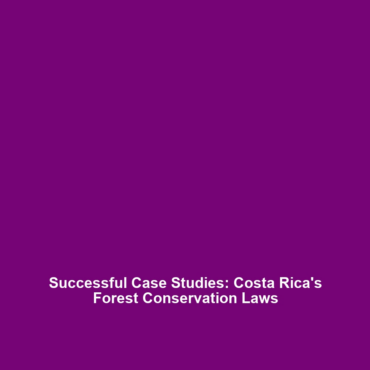Success Stories in Environmental Law Enforcement: Costa Rica’s Forest Conservation
Introduction
The enforcement of environmental laws plays a pivotal role in combating deforestation and biodiversity loss globally. This article delves into case studies of successful enforcement of environmental laws, including Costa Rica’s innovative approach to forest conservation. Costa Rica’s strategy has not only halted deforestation but has also revitalized biodiversity, serving as a model for other nations. Understanding these case studies is crucial for addressing the pressing issues of deforestation and biodiversity loss in a holistic manner.
Key Concepts
The principles of environmental law enforcement are foundational to protecting ecosystems. Key concepts include sustainable management, ecosystem restoration, and community engagement. In Costa Rica, the government’s commitment to legal frameworks, coupled with financial incentives for land conservation, has significantly reduced deforestation rates. This case study exemplifies how robust environmental laws can contribute to biodiversity preservation and address the complexities of deforestation.
Applications and Real-World Uses
Understanding how Costa Rica’s case studies are applied in the context of Deforestation & Biodiversity Loss reveals several significant applications:
- Payment for Ecosystem Services (PES): A program that compensates landowners for maintaining forest cover.
- Community-Based Conservation: Engaging local communities in conservation efforts allows for sustainable practices and promotes biodiversity.
- Ecotourism: Leveraging natural resources for tourism while preserving the environment highlights the economic benefits of conservation.
These applications highlight how successful enforcement of environmental laws fosters a cooperative approach towards conservation efforts.
Current Challenges
Despite its successes, studying and applying case studies such as Costa Rica’s approach involves several challenges:
- Policy Implementation: Ensuring effective enforcement of policies at local levels can be inconsistent.
- Funding and Resources: Securing ongoing financial support for conservation initiatives remains a challenge.
- Climate Change: The pressures of climate change complicate conservation efforts and require adaptive management strategies.
Future Research and Innovations
Future research in the realm of environmental law enforcement will focus on innovative technologies and methodologies to enhance conservation practices. Promising directions include:
- Remote Sensing Technologies: Utilizing aerial and satellite imagery to monitor deforestation in real-time.
- Artificial Intelligence: Deploying AI to analyze data and develop predictive models for forest cover changes.
- Genetic Studies: Researching biodiversity at the genetic level to inform conservation strategies better.
These innovations are expected to significantly impact the effectiveness of environmental laws in combating deforestation and promoting biodiversity.
Conclusion
Costa Rica’s approach to the enforcement of environmental laws is a compelling case study in the fight against deforestation and biodiversity loss. By focusing on sustainable practices and community engagement, this model offers insightful lessons for other countries facing similar environmental challenges. Continued investment in research and innovative strategies is essential to ensure the longevity of these efforts. For further exploration of related topics, visit our articles on sustainable development and conservation strategies.



